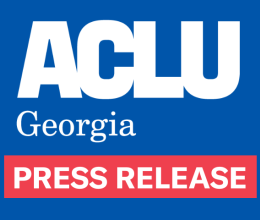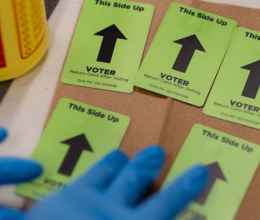Cobb Elections Board Delays Vote on Polling Site at Police Academy in Largely Black Voting Precinct
Cobb Elections Board Delays Vote on Polling Site at Police Academy in Largely Black Voting Precinct
By Matt Bruce | Atlanta Journal-Constitution | October 11, 2021
Other Pages
Voters cast their ballots for U.S. Senate runoff races during early voting at the Cobb County Elections office in December 2020. (Photo: AJC file)
When Norris Curl moved to west Cobb County from Los Angeles earlier this year, the 64-year-old Black man said one of the first things he did was register to vote in Georgia.
“Historically, Blacks have not always had the privilege of voting when it is, to me, one of the most hallowed civic duties you can carry out,” he said.
Yet, as Curl sat inside a Cobb County government facility Monday afternoon with a couple dozen other concerned voters, he worried some voters may shy away from the polls because of a recent decision elections officials made to move a majority-Black polling precinct into a police training facility.
Curl, who doesn’t regularly engage in local politics, said he attended Monday’s hearingon the issue after learning about possible voter suppression on the Fair Fight website, a voting rights organization fronted by former Georgia gubernatorial candidateStacey Abrams.
“To have a Black community polled at a police station, to me, is insensitive at the least,” Curl said moments before the meeting started.
The Cobb County Elections and Registration Board narrowly passed a measure July 19, shifting an Election Day polling site in Austell from Cooper Middle School to the Cobb County Police Academy. Elections officials met Monday to consider overturning the change, slated to take effect during next year’s midterm elections, and keeping the polling site at Cooper Middle School.
The $13 million police training facility opened in November 2020. It’s located at 2435 East-West Connector, about three miles south of the middle school.
Cobb County elections director Janine Eveler said the county has made a concerted effort to shift its polling locations out of schools for the past three years because they pose security problems and have limited accessibility. She said voters have been shut out of the polls twice because schools went on lock down for emergency threats.
Following a lengthy, and at times contentious discussion Monday, the elections board made no decision and postponed its vote to a date yet to be determined.
Elections commissioner Jennifer Mosbacher said she wanted to hear feedback from constituents in the south Cobb polling precinct, of which nearly 60% of the registered voters are Black, according to Cobb County elections records.
No voters who live within the precinct boundaries spoke during Monday’s public hearing. But there was no shortage of opinions.
Many who spoke out supported the move to the police academy, saying it offers more accessibility for disabled voters, and can help the county save money.
The American Civil Liberties Union of Georgia has been publicly critical of the move and sent the elections board a Sept. 13 letter demanding members move the voting location back to Cooper Middle School.
Broderick Jones, a 52-year-old East Cobb resident who is Black, said a polling place needs to be a welcoming family environment.
“I don’t look at a police station as a welcoming environment. It’s intimidating,” Jones told an AJC reporter. “A person who’s afraid of dogs, who am I to tell them to get over it? If you’re afraid, you’re afraid. There’s a reason behind it.”
Cobb County Police Chief Tim Cox defended his officers during the public hearing. He responded to some comments he saw in recent news articles that insisted the police academy could become a hostile environment for Black voters.
“I respect people’s opinion, and I realize not everybody feels the same way I do,” the police chief said. “But I felt like some of the comments were somewhat offensive, knowing the amount of work and effort that this police department has put into reaching out and working with all communities of this county.”
Robert Maynard accused the ACLU of “stereotyping” voters in the precinct by insinuating they are “closeted criminals” afraid to cast a ballot wherever there’s a police presence.
“I think that does a tremendous disservice to the working hard working folks in Cooper (precinct) that are just there to cast a vote,” he said. “They want to have adequate parking, easy access, and a nice clean new facility.”
Curl likened the poll relocation to having an Alcoholics Anonymous meeting inside a bar. He said he supports having community events to unite the Black community with law enforcement, but he felt there is still a divide as evidenced by last year’s protests. He also noted the historical context of Jim Crow-era tactics like “grandfather clauses” and poll taxes, which were aimed at keeping descendants of slaves from voting.
“We still have open wounds. We still have bones that haven’t healed (between) the two sides,” Curl said.
Related content
Press Release: ACLU And SPLC File Emergency Litigation To Ensure...
November 6, 2022Press Release: The ACLU of Georgia Commends Cobb County for its...
October 10, 2022Press Advisory: ACLU of Georgia Voting Rights Attorney to Testify...
October 10, 2022
Press Release: The ACLU of Georgia Urges Cobb County to Reject...
October 5, 2022Press Release: Voting Rights Organizations Challenge Cobb County...
June 9, 2022Cobb Elections Board to Reconsider Polling Place at Police Academy...
September 14, 2021